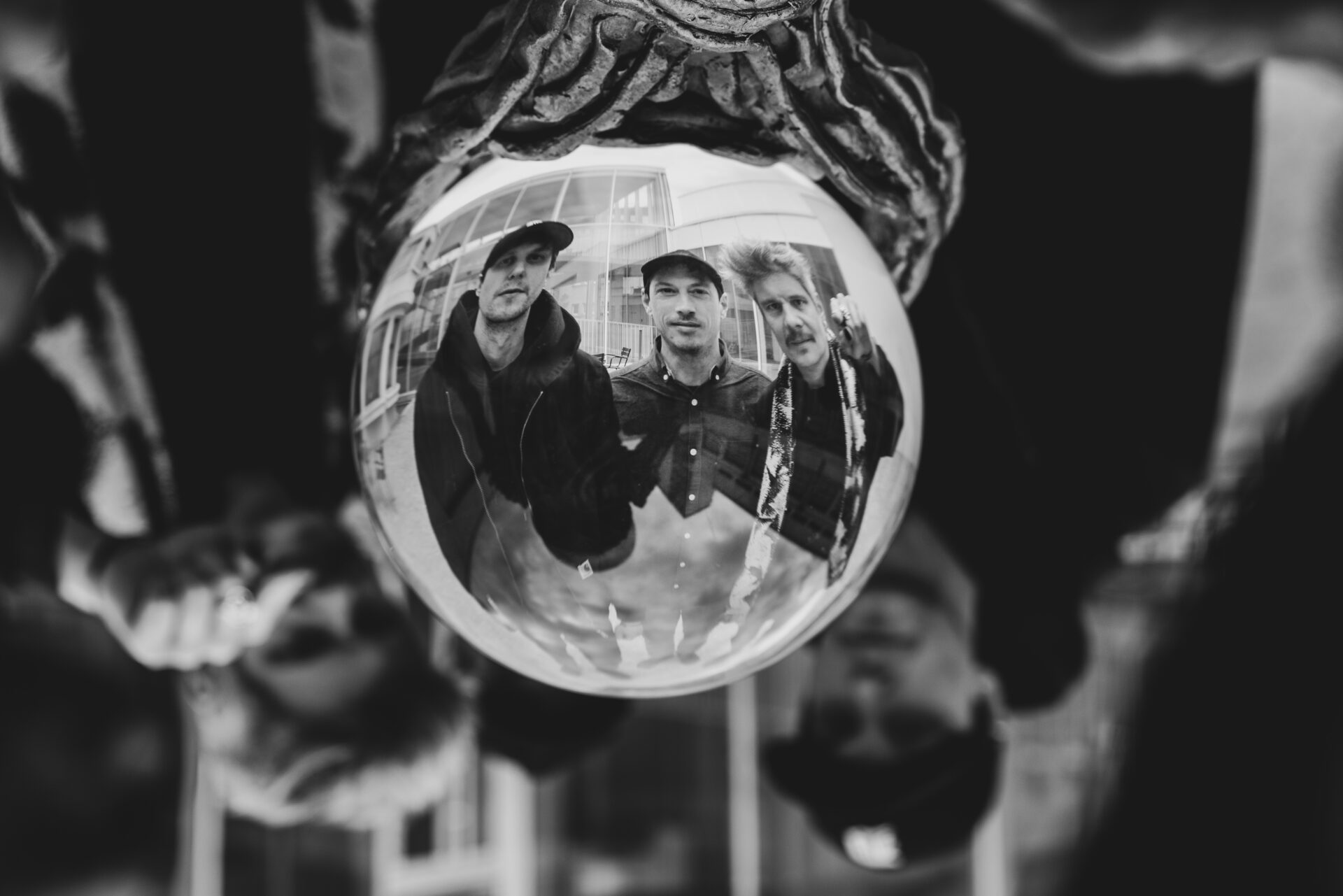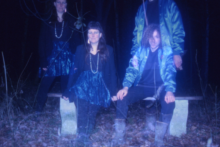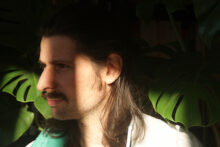‘Foudre’ In French means lightning or thunderbolt, and the most recent album from French trio FOUDRE!, Voltæ (Chthulucene), feels electrically charged, appearing like a bolt from the blue after several albums’ worth of atmospheric drone. It’s their first time recording a proper studio album rather than capturing live performances or entirely improvised sessions. On 2021’s Future Sabbath they were already inching towards this approach by adding overdubs to a recording of a show at Instants Chavirés, Paris’s equivalent to Café Oto, but Voltæ (Chthulucene) documents the full, psychedelic flowering of their new direction: vivid, lusciously layered, swarming with detuned synths as well as electric saz, zurna (a double reed wind instrument) and chalumeau (a late-baroque predecessor of the clarinet), and vibrantly rhythmic, particularly on ‘Visions From Zūrūtetsu’, ‘Acid Karma’ and ‘Cybernetic Resent’, where the beats are like tightly controlled explosions.
FOUDRE! are heading to the UK in June for several dates, including Schwetfest in Bristol and a London show with superb Franco-Italian duo Zohastre. The current touring band comprises Romain Barbot, Frédéric D. Oberland and Paul Régimbeau, although previous albums have featured composer, pianist and ondes Martenot player (or ondist) Christine Ott and Grégory Buffier, half of the original FOUDRE! line-up with Barbot, while Oberland mentions sound engineer Camille Jamain “who is a bit like the fourth person in FOUDRE!, almost like a fully-fledged member because of the vision that brings us together and through the discussions we can have together.”
Together, they form the nexus of a significant subsection of the French underground, almost constituting a scene in themselves: Régimbeau has released music as Mondkopf and Extreme Precautions and plays with La Féline’s Agnès Gayraud in Grive as well as with Oberland in post rock group Oiseaux-Tempête; Oberland, aside from his solo work, also contributes to the psych rock grooves of Le Réveil Des Tropiques and a “post-anything” quartet with Grégory D’Argent, Tony Elieh and Wassim Halal, and runs the Nahal label – which co-released Voltæ (Chthulucene) with Zamzamrec – with Régimbeau. Barbot, meanwhile, also runs Toulouse-based label BLWBCK and has his own experimental ambient project Saåad.
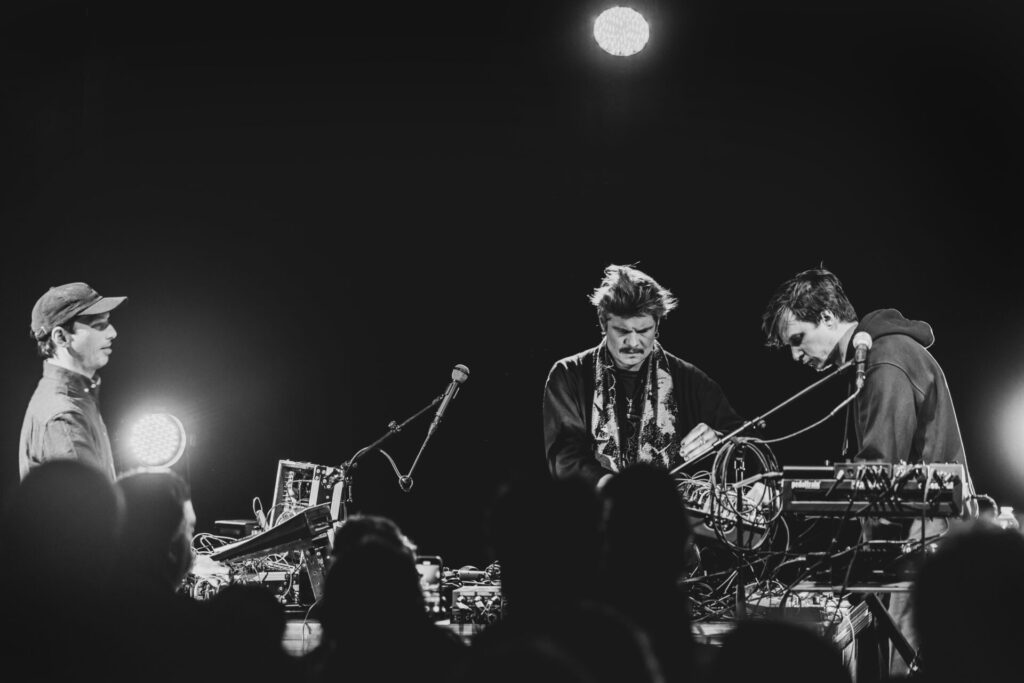
Speaking on Zoom alongside the other two, the voluble Oberland describes it as “a sort of constellation of musicians and artists who are friends with and with whom we evolve. Yeah, it’s quite funny, because I don’t often think about it like that, but from the moment we met in around 2014, 2015, there are a lot of projects that have emerged in which there are connections and at the same time I have the impression that each of them really has its own specificity. I don’t feel as though we step on each other’s toes and at the same time we inspire each other a lot. I think that if we did a really in-depth analysis of the records from each of us there are really points of connection that are super strong, but which still retain each person’s sensibility.”
The contours of FOUDRE! started to come into focus when Barbot met Oberland and invited him to play with his partner in Saåad, Grégory Buffier. “We found ourselves one afternoon saying to ourselves, ‘You’re in Toulouse, come on let’s have a jam’,” Barbot recalls. “I hit record and that gave us the first album (2015’s Magnum Chaos), and that was basically the first time we’d played together.” Régimbeau then joined after being invited to play the show that became the soundtrack to Earth, an experimental film by Singaporean artist Ho Tzu Nyen.
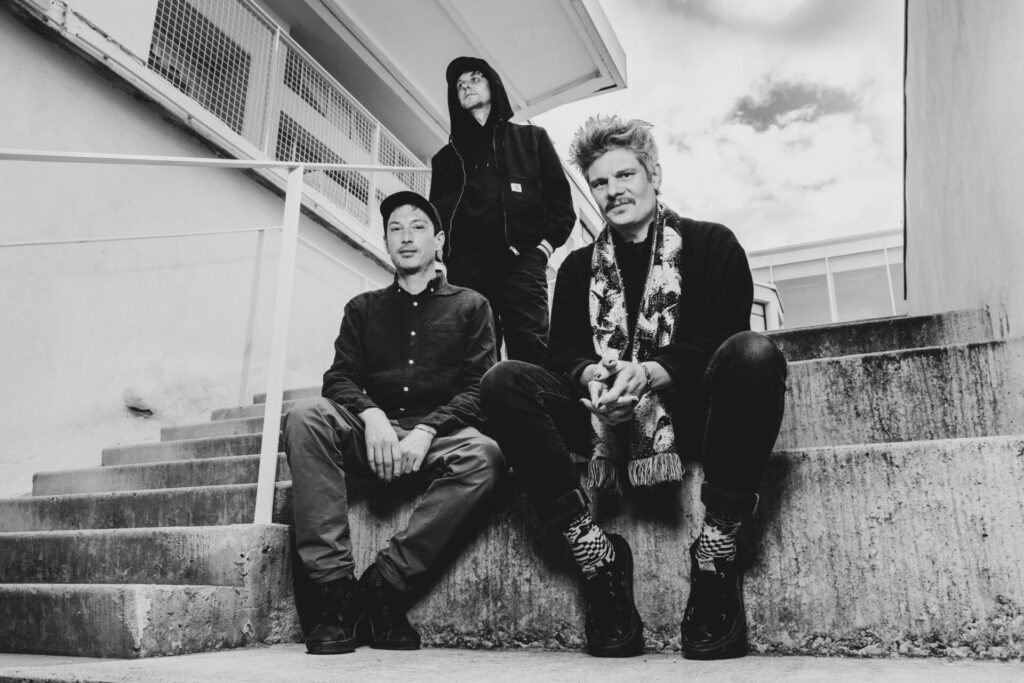
Voltæ (Chthulucene) undoubtedly marks a shift in their level of investment in FOUDRE! “It was a little bit of a project on the side, but I think all three of us wanted at one point or another to find the time to develop it,” says Oberland. But they’re also keen to stress that the foundations for the album were already being laid in live shows prior to lockdown. “I have the impression that this change was already decided in our heads and that we finally have a record that resembles the project as we had imagined it for quite a long time,” says Barbot. “We all remember a moment that was very important for us, at Festival Visions (in Brittany). That’s where Paul really let loose with the techno side. And we were really into it, and then COVID happened, which stopped us. When we got back together, we wanted to start from that.”
Oberland recalls the festival as “a slightly crazed moment that can happen on stage. We were still in improv mode and Paul started with this incredible rhythm, a bit like hip hop, and there were maybe 200, 300 people watching, it wasn’t a lot given the size of the festival. And we were all a little nervous, but at a certain point we felt that something was happening, we looked out and it was full of people, a sort of human tide, headbanging to the beat.”
Régimbeau compares their current set-up to “a nervous system. We have a master clock and we’re all connected to it so that we have a little bit of freedom to try things and at least have a rhythm that holds. But we also have a lot of modular synths which allow us to send modulations to each other. It allows us to have something quite live between us, even though it’s all done with machines.”
As far as what Voltae is about, I wonder about the references to the occult in their work. Régimbeau agrees that “we’ve all read fantasy and science fiction. There was really the idea of creating a kind of fictional world. Romain worked a lot on the narrative of the album.” But, according to Barbot, the ‘Chthulucene’ is unrelated to Lovecraft and is “based on the philosopher Donna Haraway, who Fred was interested in. She imagines a world where we could live in the future in symbiosis with all these organisms, mushrooms, plants and animals. So it’s not an apocalyptic record in fact, it imagines that life will bounce back even if civilizations collapse, and how they could reinvent themselves.”
FOUDRE! have undergone a reinvention of their own, but the ritualistic dimension to their performances is a constant. And it’s when they discuss their approach to live shows that they start to get a bit mystical. “We don’t rehearse much,” says Oberland. “We have to create the conditions for something a little unique and special. And I think that this slightly performative aspect has a sacred dimension. Not sacred in a religious sense – or if it is religious, it’s more the religare (the Latin stem for the word religion, meaning to bind). What is it that connects us? What makes us decide at a given moment to go on stage and throw ourselves into the unknown? Obviously, there needs to be a lot of trust between the three of us, and something special has to happen that brings us out of ourselves.”
FOUDRE! appear alongside Das Kinn, Zohastre, Kou, Drainolith and GGED at Schwetfest, Strange Brew, Bristol on Friday 20 June

